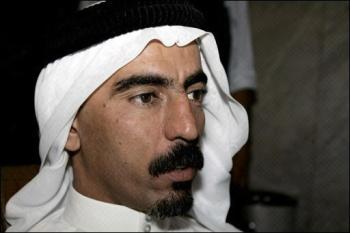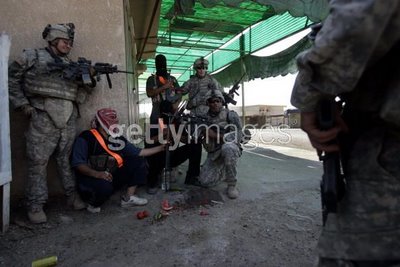Cowardly assassination of a real resistance fighter.
 I'm not one to make liberal use of the word "cowardly" when describing attacks by terrorist groups, especially those that result, either purposely or accidentally in the death of the perpetrator himself. Whatever we think of the motives behind suicide attackers, or what personal inadequacies or perverse thinking leads them to make such a unjustifiable decision, the act itself of ending your own life, in essence for what you believe in, even if you believe that the act itself will result in your installment in paradise, is not one which can be described as "cowardly". While suicide has for a long time been caricatured as taking the cowards' way out, and we can criticise the person for not caring about the mess that their death will both leave behind and create, the taking of ones own life requires strength that can never be dismissed as being easy to achieve or as an essentially empty act.
I'm not one to make liberal use of the word "cowardly" when describing attacks by terrorist groups, especially those that result, either purposely or accidentally in the death of the perpetrator himself. Whatever we think of the motives behind suicide attackers, or what personal inadequacies or perverse thinking leads them to make such a unjustifiable decision, the act itself of ending your own life, in essence for what you believe in, even if you believe that the act itself will result in your installment in paradise, is not one which can be described as "cowardly". While suicide has for a long time been caricatured as taking the cowards' way out, and we can criticise the person for not caring about the mess that their death will both leave behind and create, the taking of ones own life requires strength that can never be dismissed as being easy to achieve or as an essentially empty act. This is why the spectre of suicide bombers on the loose is so viscerally terrifying; the cliche of "them" loving death while we love life does have some merit to it. We do everything we can, not just to escape death, but to prolong our lives and to halt the visible signs of aging, while their attachment to at least this plane of existence is so flimsy that they'll sacrifice everything for something completely unachievable and take numerous innocents with them in the bargain. Susan Sontag's comments just after September the 11th, that "cowardly" would be a term better applied to those who also make use of planes but who rather than using the machines themselves as weapons drop their explosive cargo from a great, safe height, have never lost their resonance.
The assassination of Abdul Sattar Abu Reesha, the leader of the Anbar Salvation Council, most likely by a improvised explosive device planted in his car by al-Qaida fighters disguised as petitioners who visited the Sheikh yesterday on the first day of Ramadan, was however most certainly a cowardly act. Rather than killing him using a suicide bomber, as al-Qaida in Iraq's calling card has been, they used their weakest and lamest tactic, used to kill dozens of American soldiers, as well as countless other innocent Iraqis.
We shouldn't overplay the significance of the emergence of the Anbar Salvation Council, which is exactly what Petraeus did earlier in the week in his statements to Congress and the Senate, but the rising up against the "Islamic State of Iraq" has always been the most welcome development to occur in Iraq in years. It showed that no longer were the Iraqis prepared to exchange one tyranny for another, from Saddam's secular police state to al-Qaida's extremist implementation of Sharia law, which had for a time prospered amongst the Iraqi tribes that had the most to lose from Saddam's overthrow. Their tactics may have at times been no better than that of the fighters they turned against, but they remain the best hope of eradicating the "Islamic State", something that the Americans can never possibly imagine to achieve.
While Abu Reesha's death shows just how deep the problems in Iraq still are, away from the rosy image presented this week, it by no means marks the blowing apart of the hopes of pacifying Iraq, as Patrick Cockburn writes. If anything, Reesha's death is likely only to galvanise those opposing the takfirists into being ever more determined to eject the murderers that set-up home after the invasion.
Another welcome development was contained in an interview with the spokesman for the Islamic Army in Iraq, who made clear that his group, unlike al-Qaida, are prepared to negotiate with the Americans. It can't be coincidence that as al-Qaida continues its barbarism, exemplified by the indefensible attacks on the Yezidis, the other insurgent groups continue to move towards a position of opposing the "Islamic State" while being prepared to end their own struggle, as long as the Americans themselves also withdrawal. As the release of another new report suggests that the death toll since 2003 could be even higher than previously feared, the need to bring the conflict to an end becomes more urgent than ever.
Similarly, the deteriorating situation in Basra, as reported by the Times which makes clear just how unsafe former employees of the British army now are, necessitates that we quickly identify all those we owe a debt of service to and offer them sanctuary, even if only temporarily. You can still make your voice heard by contacting your MP and informing them of the "we can't turn them away" campaign.
Labels: "cowardly", Abdul Sattar Abu Reesha, Anbar Salvation Council, Iraq, Iraq disaster, Iraqi jihad, refuge for Iraqis



